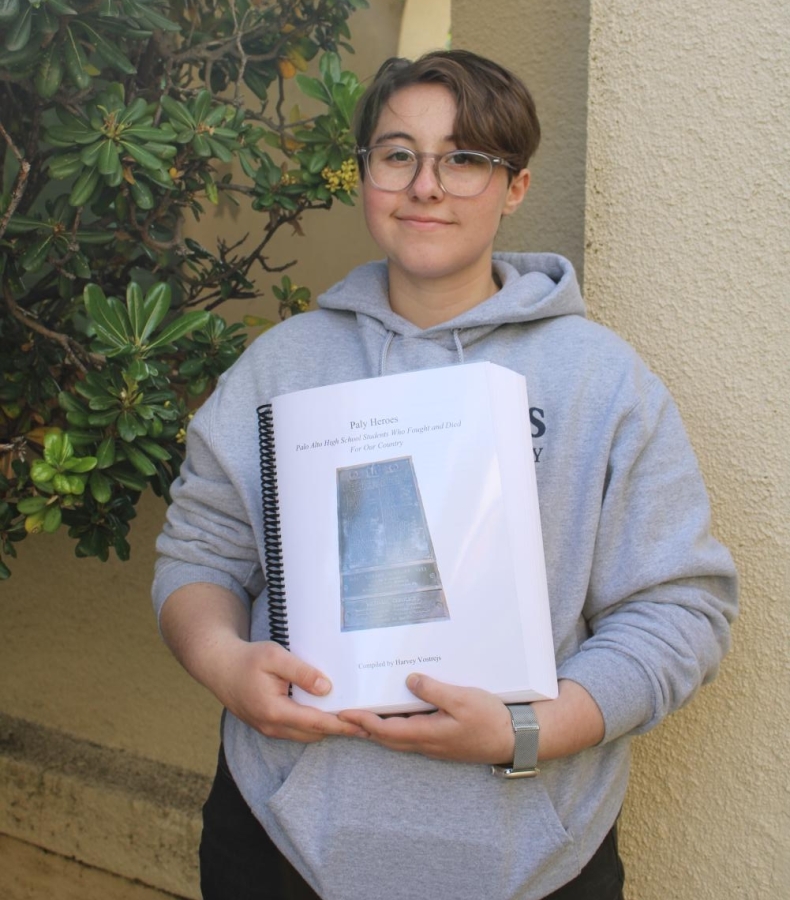A voice for veterans: Senior celebrates school’s war heroes
FINAL PRODUCT – Palo Alto High School senior Harvey Vostrejs poses for a photo holding a physical edition of his research project, “Paly Heroes”. “It was something to do with my time and it had an impact,” Vostrejs said. “I could see it having an impact.” Photo: Melody Xu
On a walkway along the edge of the Tower Building, a bronze plaque lies on the dirt under a green hedge. “This plaque is dedicated as a memorial to those students of Palo Alto High School who gave their lives while serving their country in World War II,” it reads.
Palo Alto High School senior Harvey Vostrejs said he was painting a set for the Paly Theatre program when the plaque piqued his interest.
“I saw this plaque and I was kind of staring at it and staring at these names and it kind of hit me, like ‘Who are these people?’” Vostrejs said. “It was covered in dirt, trash. It looked forgotten, and it made me really, really sad. These were people, here, who were like us, and they don’t deserve to be forgotten like that.”
Since the beginning of his junior year, Vostrejs has been developing the book “Paly Heroes,” a compilation of the life stories of over 80 veterans from World War I, World War II, the Korean War and the Vietnam War. The book is available online as a Google Doc updated monthly, and in physical form with one printed copy in the Paly library.
“I basically compiled all of the information that I could find on these people to protect their stories and make sure that they’re told,” Vostrejs said.
The writing process began with long hours in the upstairs section of the school library, where archives of Paly yearbooks are kept.
“Out of curiosity, I was like, ‘I’m gonna come up here and look at these old yearbooks and find the people who were on the plaques,’” Vostrejs said. “And once I found the pictures of them in the yearbooks, it’s hard to explain, but it hit me like ‘Oh my God, this isn’t just a name, it’s a person.’”
Vostrejs said that this type of research was right up his alley.
“I went through pretty much every yearbook we have from those eras,” Vostrejs said. “I came before school, after school, during my prep and the lunches and I was just always here, poring through those yearbooks.”
That was only the first step of the research, Vostrejs said. He moved on to the National Archives, reaching out to and interviewing past veterans, Paly alumni, and family members of those being profiled to continue collecting information.
“I would find siblings in the yearbooks and I went onto Ancestry.com, but most of the direct family members were dead and those who were alive, it was basically impossible to track them down,” Vostrejs said. “I had two family members that reached out to me … and they sent me information and chatted with me about it and shared their stories. I’m hoping as this book gets out there that more families will reach out.”
Eric Bloom, Vostrejs’ Social Justice Pathway teacher, said that Vostrejs is an archivist at heart.
“He loves to understand what has happened in the past by looking at the way it was reported on,” Bloom said. “He has that research mindset of, ‘How can I find the documents to explain these people?’ That’s a very historian-like approach in the sense of saying, “There has to be a record. There has to be something there.’”
Vostrejs said, though the process was lengthy and arduous at times, he enjoyed exercising his research skills.
“I really do like researching, but this pushed me to my limits because I had to go into the [older] parts of the web,” he said. “I spent probably hundreds of hours doing it but I never felt burdened by it, like, it was really fun.”
Vostrejs said that the book is intentionally intended for an online format rather than distribution in print form, and not just because printing copies is expensive.
“Since it’s a living document … there was already new information in the last two weeks,” he said. “It doesn’t make sense to publish it when it’s constantly being updated. I’d like people to be able to access it online and know it exists.”
Darla Secor, a historian and archivist at the Palo Alto Historical Association, says that Vostrejs’ book is a great resource.
“It’s very important because, as far as I know, no one else has done this with all of the veterans,” Secor said. “I’m sure there’s been write-ups about certain ones, but to have a complete list and all that information in one place is amazing.”
Bloom agrees.
“There’s future value,” Bloom said. “If someone wants to learn about [the people profiled in the book], they could look at the copy in the library and find out what was going on. Then the next archivist could use Harvey’s book.”
Up next, Vostrejs said he is filing a Public Records Act request to get further information about the book’s subjects. He continues to view the project as a working document and hopes to keep developing it for the foreseeable future.
Click here to view the digital version of “Paly Heroes” by Harvey Vostrejs.



